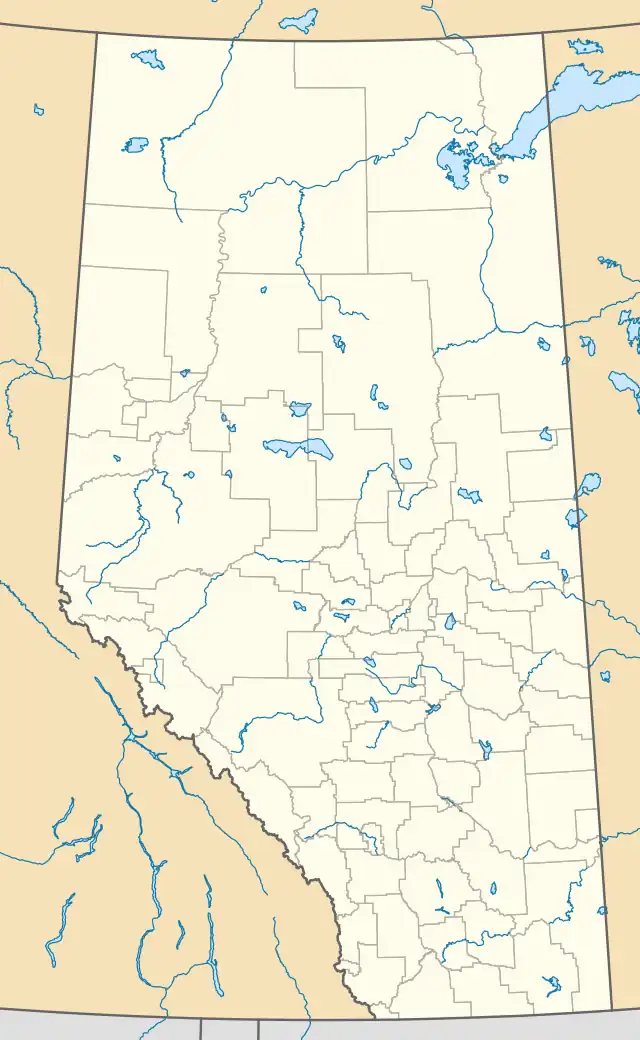Torrington | |
|---|---|
.jpg.webp) Clem T. GoFur | |
 Location of Torrington in Alberta | |
| Coordinates: 51°47′29″N 113°36′21″W / 51.7914°N 113.6058°W | |
| Country | Canada |
| Province | Alberta |
| Census division | No. 5 |
| Municipal district | Kneehill County |
| Government | |
| • Type | Unincorporated |
| • Governing body | Kneehill County Council |
| Area (2021)[1] | |
| • Land | 0.4 km2 (0.2 sq mi) |
| Elevation | 950 m (3,120 ft) |
| Population (2021)[1] | |
| • Total | 306 |
| • Density | 761.2/km2 (1,971/sq mi) |
| Time zone | UTC−7 (MST) |
| • Summer (DST) | UTC−6 (MDT) |
Torrington is a hamlet in central Alberta, Canada within Kneehill County.[2] It is located approximately 160 kilometres (99 mi) northeast of Calgary at the junction of Highway 27 and Highway 805.
The hamlet is located in Census Division No. 5 and in the federal riding of Crowfoot.
The main industry is agriculture.
The community is home to the Gopher Hole Museum, dedicated to stuffed Richardson's ground squirrels (technically not gophers) in anthropomorphic taxidermy settings.
A very large outdoor gopher sculpture[3] (12 ft high) named "Clem T. GoFur" is located in the village.
All 11 of Torrington's fire hydrants were painted to look like gophers.
Torrington was incorporated as a village until 1997, when it dissolved to hamlet status under the jurisdiction of Kneehill County.[4]
Demographics
In the 2021 Census of Population conducted by Statistics Canada, Torrington had a population of 306 living in 137 of its 146 total private dwellings, a change of 52.2% from its 2016 population of 201. With a land area of 0.4 km2 (0.15 sq mi), it had a population density of 765.0/km2 (1,981.3/sq mi) in 2021.[1]
As a designated place in the 2016 Census of Population conducted by Statistics Canada, Torrington had a population of 170 living in 83 of its 89 total private dwellings, a change of -5% from its 2011 population of 179. With a land area of 0.63 km2 (0.24 sq mi), it had a population density of 269.8/km2 (698.9/sq mi) in 2016.[5]
See also
References
- 1 2 3 "Population and dwelling counts: Canada and designated places". Statistics Canada. February 9, 2022. Retrieved February 10, 2022.
- ↑ "Specialized and Rural Municipalities and Their Communities" (PDF). Alberta Municipal Affairs. January 12, 2022. Retrieved January 21, 2022.
- ↑ Alberta Travel. "Unusual Attractions". Retrieved November 20, 2007.
- ↑ Alberta Municipal Affairs. "Kneehill County". Retrieved November 16, 2007.
- ↑ "Population and dwelling counts, for Canada, provinces and territories, and designated places, 2016 and 2011 censuses – 100% data (Alberta)". Statistics Canada. February 8, 2017. Retrieved February 13, 2017.